|
Recently, this balanced armature type earphone has entered the audio accessories market. This type has been so far used mainly as a speaker unit for hearing aid, communications apparatus, etc., and further in former times, this structure used to be for a speaker built in the hand set of the so-called black-colored telephone set (which the younger generation might not be able to recognize). Reason why this type of earphone recently started to receive much attention is because of public manners that require people to prevent a noisy clattering sound from leaking out of an earphone or headphone worn by a neighbor in the public place (ex. in a train). And furthermore, this type is excellent unexpectedly in some other respects.
How do you prevent a leaking of such the noisy clattering sound?
We can do it by means of the Hi stiffness diaphragm employed in the structure, which is of not soft but stiff characteristics.

There are two reasons to hear the clattering sound leaking out when an earphone or a headphone of conventional dynamic type's structure is put on the ear.
| 1. | It is structured to leak the sound out of the back of speaker to lessen the acoustic impedance of earphone or headphone. |
| 2. | For the same purpose, it is also structured to leak the sound out of a part of ear where it is put on. |
The above two reasons are because such the structures should be necessarily employed when the dynamic type driver unit with Hi compliance (low stiffness (soft)) diaphragm seeks for higher quality of sound.
* Detail of dynamic type (dynamic transducer) unit will be discussed separately some time later.
Then, the reasons why the Hi compliance diaphragm should have such the structures are per below:
Following is an illustration simulating a bicycle pump to show the state of ear where no sound leakage out of external auditory canal exists when earphone is put on.
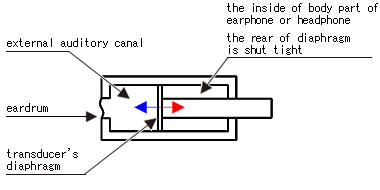
When the diaphragm, under the condition that it is softer than eardrum (Hi compliance), moves in the blue arrow direction, it compresses the air in the external auditory canal to a certain extent, and then such the Hi compliance diaphragm becomes defeated by the compressed pressure. Further pushing in that arrow direction would deform the diaphragm, which we think is experientially understandable.
And, the movement in the opposite direction (shown by a red arrow) would cause the diaphragm to become defeated, not comparing with eardrum's stiffness, but by air pressure compressed inside the completely closed body. This phenomenon is represented in the field of the sound that the transient characteristics are poor.
Thus, the Hi compliance dynamic type earphone or headphone that has a closed structure would not be able to show its excellent characteristic faculty.
Balanced armature type (electromagnetic converter) has enough stiffness on its diaphragm to exceed the compression pressure at front & rear surfaces of the diaphragm that is caused when the diaphragm itself moves in the closed box condition, and thus would be able to provide such a sound quality as the dynamic type could not reproduce.
Typical Structure of Balanced Armature Type
Structure 1 (2 magnetic pole type):
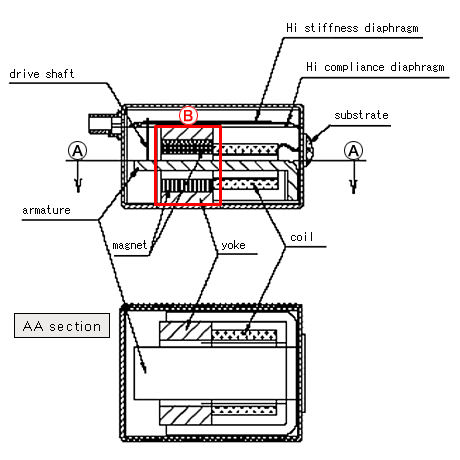
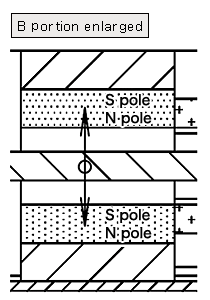 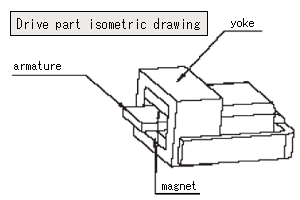
An armature (moving iron) going through the center of air core coil is magnetically induced to electric signal.
And, because the armature, at its end, goes through a closed magnetic circuit, the armature magnetically induced becomes caused to move up and down to electric signal in that closed magnetic circuit.
Top and bottom magnet works to attract the armature in the arrow direction with equal force respectively.
Because of such the equal force taken, this seems to be called the balanced armature from a viewpoint of being balanced.
Yoke of magnetic circuit has a closed magnetic circuit in a rectangular shape as shown in the isometric drawing.
Structure 2 (1 magnetic pole type):
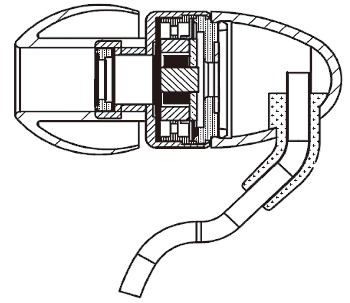
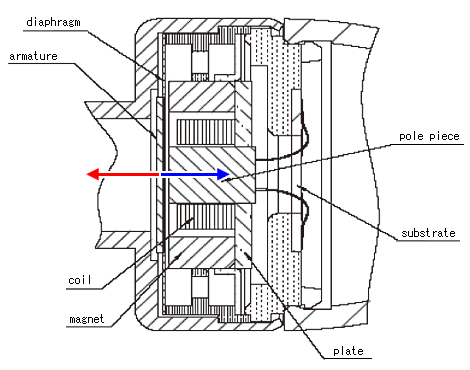
Conversion factor would be greatly improved by getting both positive stiffness of diaphragm (red arrow) and negative stiffness of magnet (blue arrow) well balanced in an ideal position.
Magnetic circuit composes a closed magnetic circuit through the armature. Coil is positioned around the outside circumference of pole piece to have the electric signal magnetically induced to the pole piece. Thus, the balanced armature is designed to move.
Advantage & Disadvantage of Dynamic type and Balanced armature type (2 Magnetic pole type & 1 Magnetic pole type)
| Dynamic type | HiFi balanced armature type |
| 2 magnetic pole type | 1 magnetic pole type |
| Miniaturization | 10PHI almost limit | 10mm or less square mainly | 10PHI almost limit |
| Structure | simple | complicated | simple |
| Cost | manufacture in China mainly | very costly | about half of that for 2 magnetic pole type |
| Designability of acoustical system | sound designing possible at front & rear of diaphragm | sound designing not possible at front & rear of diaphragm | sound designing possible at front & rear of diaphragm |
| Conversion factor | bad | not so good possibly because of characteristics control | very good |
| Current consumption | bad | not so good possibly because of characteristics control | not less than 1/4 of that for dynamic type 16ohm |
Concept
Design of sound transducer employs the balanced armature type of 1 magnetic pole type to enable the pursuit of not only mechanical but also acoustical system characteristics, etc.
Future
Balanced armature type has the advantage of higher conversion factor in relation to its structure having very high assembling accuracy.
This higher conversion factor means less current consumption, and thus is considered to have a good future particularly in personal use commodities where battery consumption is a point of issue. Also, this follows the trend of the times when the energy saving is a matter of importance from a viewpoint of ecology which is frequently talked about nowadays.
For reference
This balanced armature type can be put into a category of electromagnetic transducer.
Our company's products can be categorized per below:
| Electromagnetic transducer | ME2 type | | |
| MEN type | | |
| ME146 type | | |
| ME101 type | | balanced armature type (1 magnetic pole type) |
| N20 type | (mass production in preparation) | balanced armature type (1 magnetic pole type) |
| throat microphone | | balanced armature type (1 magnetic pole type) |
| Static transducer | N5 type |
| various stereophonic earphones |
| Static transducer | tiepin microphone |
* N20 type: employs a small-sized balanced armature type ME202 for high-performance HiFi.
Following is a comparison in frequency characteristic between ME202 type (red color curve) and a dynamic type (black color curve) of similar sizes, measured under the same condition.

|
